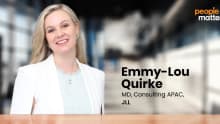Eric Riego de Dios on how people analytics is redefining HR

Eric Riego de Dios is Baker McKenzie's Global Process Owner for Hire to Retire and also manages the Firm’s Talent Systems and People Analytics. Until December 2018, Eric worked as the People Director for the firm's first and largest service center, in Manila. Before joining Baker McKenzie, he has worked in companies such as IBM, Citi, and DHL.
Currently, he leads the transformation of Baker McKenzie’s “people” processes by utilizing innovative new technology and improving on already high standards of operational effectiveness and client service orientation.
Talking with People Matters, Eric discusses the role of people analytics and its potential to truly modernize the way organizations attract, retain and reward talent. He also shares how HR professionals can leverage analytics to strengthen people processes, thereby enhancing employee and client experience, fortifying HR's voice in the boardroom.
Data analytics is redefining most of the HR strategies, creating more opportunities and enabling HR leaders to enhance employee experience. What are some key people functions where analytics is making a promising impact?
The HR function, as a whole, is going through a transformation strongly driven by people intelligence. The perspective towards analytics has changed from being 'an initiative' to being an imperative. Through this, HR has reasserted its importance in the business arena. In the early years, HR leaders mostly hailed from the fields of social sciences like sociology or behavioral sciences like psychology and were required to concentrate on recruitment and selection, engagement, and industrial relations. This pattern has now drastically changed and the demand for more unconventional and cutting edge HR professionals has increased. Now, successful HR professionals often come from operations, actuary, and engineering. Their background has given them the facility to find meaning and connections in data, while simultaneously displaying efficiency in speaking the language of business to convey compelling stories that translate strategies to actionable decisions.
The traditional HR remit of recruitment, training, total reward, and employee relations are expected to undergo a transformation and become more data-driven.
HR must adapt and accommodate new functions such as culture creation, employer branding, employee experience, and workforce analytics where people intelligence is leveraged for optimal business results.
Over the coming years, we are looking to establish a significantly different way of doing things. Of course, there is much we will retain but we will also look to redefine and emphasize the newly found comfort level of HR practitioners in dealing with numbers and using analytics to deeply understand people issues and to offer innovative solutions and interventions.
Analytics today is enabling companies to have deeper insights as to why people leave and predict where and when a surge of attrition could happen. Some of the pioneering HR organizations' attrition framework and models are so predictive that some companies have registered for patents.
How far has HR been able to leverage the opportunities created by people intelligence?
It’s a journey towards building the discipline and culture of a data-driven organization.
Some organizations have progressed more than others because of acceleration factors like technology, corporate values and strategy alignment, leadership mindset and capability building.
Other companies lagged because of risk aversion and bureaucratic complexities. There are industries that are more advanced than others like for example the technology and telco industries as opposed to the cooperatives and NGOs. Nonetheless, these are largely enablers or derailers.
At the end of the day, it is the willingness and desire of the HR practitioner to be relevant and essential to the business of the enterprise that matters. Practitioners, who were able to adapt to this new strategic requirement and have invested time and effort to build and/or buy analytics capability for their organization, are now able to offer more sophisticated solutions. Such as identification of high-quality and sustainable talent pools across geographies, successful profiling of enduring candidates, early identification of high potentials, and prevention of premature key talent departure.
How is Baker McKenzie leveraging analytics to enhance its people agenda?
Baker McKenzie strives to be ahead of the curve in adopting innovative techniques to better serve its clients. We were one of the first law firms in the world to adopt design thinking to help clients with new and effective solutions and have also been leveraging artificial intelligence to enhance quality and efficiency in our operations.
Our agile approach in transformation ensures that we are able to address nuances and course-correct as necessary depending on new challenges and the changing business landscape.
We are serious about our D&I initiatives and apply simple and straight forward metrics to track and determine where we are versus our global aspirational targets. We determine which regions and levels can influence our gender ratios and purposely direct efforts to relevant levers. We are also able to make accurate estimations on when we are able to achieve targets through extrapolations and regression analysis.
Across all our centers, we apply analysis to determine the most effective and popular style of learning for our leadership initiatives, and we leverage these platforms to advance our development agenda. We then apply analytics to understand if the program is effective and, based on inputs, re-design the program accordingly to build the most effective learning solution for our employees.
We also apply analytics in our wellness efforts. A few years ago, our Manila Center in the Philippines was recognized as Wellness Company of the Year and our Belfast Center achieved a similar accolade in Northern Ireland. This sort of recognition further accelerates our efforts in enhancing the health of all our employees from a holistic perspective, resulting in increased quality and greater productivity.
In Manila, for example, we employed regression analysis, using historical data to create pro-active and preventive health programs by analyzing the number of sick leaves, reasons for leaves, reasons for consultation, availed medicines, annual physical exam results and our people demographics. We were then able to demonstrate very clear relationships and trends among an increased number of health initiatives, increased productivity, decreased absences and increased service quality in a span of 18 months.
What are the opportunities in analytics that HR has not yet been able to build on and how can they do so?
There are pioneering HR practitioners who are now adopting analytics as part of their discipline and practice. However, unfortunately, a vast majority of the HR community remains on the sidelines when it comes to people analytics.
We often say that we would like to increase our business acumen and speak in the business language. However, we fail to see that data analysis is a means to achieve greater knowledge of the business, and use the same to speak and narrate compelling business propositions.
There have been efforts by some groups to further raise awareness on the use of people analytics for business. However, it's a personal choice and an individual journey that each practitioner has to take ownership of and truly pursue, to continue to be relevant.
















